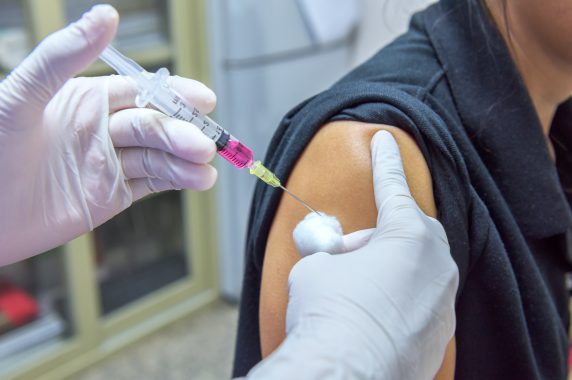Flu and Covid vaccination campaign to run from 3 October to 20 December

GPs should vaccinate eligible groups against flu and Covid between 3 October and 20 December, NHS England has said in its latest update.
NHSE announced in March that the flu vaccination programme would be moved from September to October this year in order to maximise vaccine effectiveness, with Covid vaccination to commence at the same time.
Pregnant women and children will still be offered flu vaccination from 1 September.
In a letter sent yesterday, NHS England chief delivery officer and national director for vaccinations and screening Steve Russell said the October start date ‘reflects JCVI advice that the flu vaccine’s effectiveness can wane over time in adults and so a later start date is preferable’.
The Covid vaccination start date ‘aligns to flu to support co-administration of flu and Covid-19,’ he added.
‘The advice differs for children, because flu circulates in this age group earlier and protection lasts longer.’
He also warned that payment ‘will only be made for flu and Covid-19 vaccinations administered from the service commencement date onwards’ and said NHSE ‘anticipate that most flu and Covid-19 vaccinations should be completed by Friday 20 December 2024’.
However, ‘outreach activities’ for Covid vaccination ‘should continue to be delivered to underserved communities until Friday 31 January 2025’ and flu vaccinations ‘will be available until Monday 31 March 2025’.
Mr Russell said: ‘It is vital that the autumn/winter 2024/25 vaccination delivery network includes outreach services to meet the needs of communities that are currently disadvantaged, particularly those who are more deprived. For example, providers may want to consider how to design services for people who struggle to make appointments during working hours.
‘We would expect that any provider would make reasonable efforts to reach the whole eligible population.’
NHSE also said teams should ‘pay special attention to other vaccinations alongside the seasonal programme and to co-administer vaccines where it is appropriate and clinically safe to do so’.
‘In particular, local teams should look to signpost and, where possible, provide other vaccines to those who are eligible (for example, shingles to those in eligible age groups, and pertussis for those who are pregnant).’
The letter went on to instruct ICBs to work with PCNs to prioritise care home and housebound older adults.
The National Booking Service will open to bookings from the public from 23 September, with booking dates available between 1 October and 20 December for both flu and Covid.
In an update last week, the Department of Health and Social Care (DHSC) confirmed that the national autumn vaccination offer would extend to all primary and community healthcare staff involved in direct patient care, despite not being recommended by the JCVI.
Yesterday’s NHSE letter said employers should ‘signpost staff to the most convenient Covid-19 vaccination offer’.
‘This may be through NBS, where staff can self-declare their eligibility,’ it said.
Mr Russell added that ‘details of the vaccine to be used in autumn/winter 2024/25 will be confirmed shortly’ but that NHSE England is ‘not anticipating any supply constraints’
‘Initial volumes of vaccine supply will be made available prior to the start of the programme,’ he said.
Covid vaccines are centrally procured by the Government, while GP practices still order flu vaccines themselves from a JCVI-approved list. In June, they practices advised this year’s offer would not include Sanofi’s QIVr vaccine used in previous campaigns, but the UK Health Security Agency said an alternative had been secured to meet demand.
In December last year, NHS England’s long-awaited vaccination strategy revealed that there are plans to centralise the procurement of adult flu vaccines.
Groups eligible for vaccination
Flu vaccination:
From 1 September 2024:
- pregnant women
- all children aged 2 or 3 years on 31 August 2024
- primary school aged children (from Reception to Year 6)
- secondary school aged children (from Year 7 to Year 11)
- all children in clinical risk groups aged from 6 months to less than 18 years
From 3 October:
- those aged 65 years and over
- those aged 18 years to under 65 years in clinical risk groups (as defined by the Green Book, Influenza Chapter 19)
- those in long-stay residential care homes
- carers in receipt of carer’s allowance, or those who are the main carer of an elderly or disabled person
- close contacts of immunocompromised individuals
- frontline workers in a social care setting without an employer led occupational health scheme including those working for a registered residential care or nursing home, registered domiciliary care providers, voluntary managed hospice providers and those that are employed by those who receive direct payments (personal budgets) or Personal Health budgets, such as Personal Assistants
Covid vaccination:
- residents in a care home for older adults
- all adults aged 65 years and over
- persons aged 6 months to 64 years in a clinical risk group, as defined in tables 3 and 4 of the Covid-19 chapter of the UK Health Security Agency (UKHSA) Green Book on immunisation against infectious disease
- patient-facing health and social care staff (although the JCVI has advised these be excluded from the national programme and instead offered vaccination via occupational health schemes in future years)
Source: Department of Health and Social Care and NHS England
Visit Pulse Reference for details on 140 symptoms, including easily searchable symptoms and categories, offering you a free platform to check symptoms and receive potential diagnoses during consultations.









